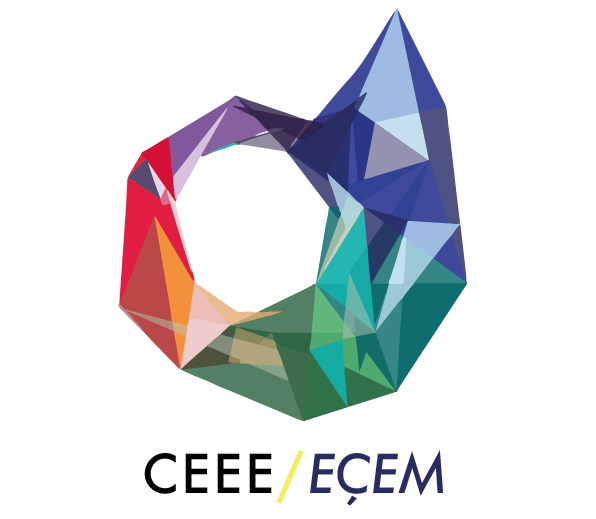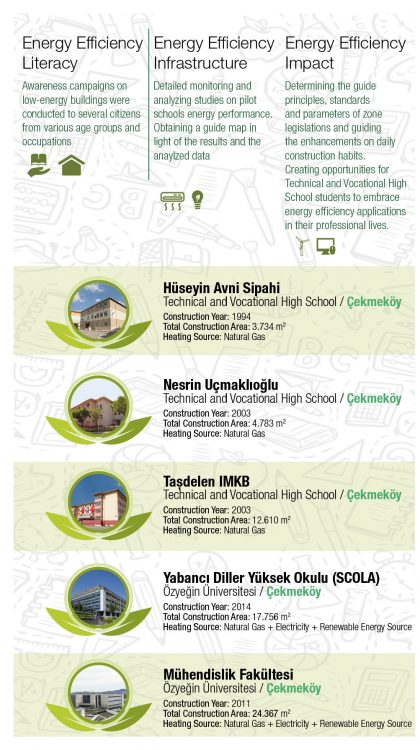Project Starting – Ending Dates: 15/09/2017 – 14/05/2018
Funded by: EU IPA and Central Finance and Contracting Unit
Project Budget: 49,997.89 € (CFCU Contribution)
Özyeğin – CEEE budget: 49,997.89 €
Project Team: M. Pınar Mengüç, Yasemin Somuncu, Nil Kutlar, Dilek Saygı
Project Partners: Turkey: CENTER FOR ENERGY, ENVIRONMENT AND
ECONOMY (CEEE)
Participants: ÇEKMEKÖY DISTRICT GOVERNORATE,
ÇEKMEKÖY MUNICIPALITY, ENERJI EFFICIENCY
ASSOCIATION, ENERGY EFFICIENCY AND
MANAGEMENT ASSOCIATION
Pilot Schools: Çekmeköy Hüseyin Avni Sipahi Industrial
and Technical Anatolian High School, Çekmeköy Nesrin
Uçmaklıoğlu ITAHS, Taşdelen IMKB ITAHS, School of
Foreign Languages (SCOLA)/Özyeğin University Campus,
Engineering Faculty/Özyeğin University Campus
Other people and organizations who contributed to CAPACITY Project: CEEE (Yasemin Somuncu, Nil Kutlar, Dilek Saygı, Gülçin Mezireli)
EYODER (Cihan Karamık)
ENVER (Naci Işıklı)
DEFANS CONSULTANCY AGENCY (Aytül Çalışkan)



WHY
EU CAPACITY-YENI-NESIL Project, has been designed and completed in order to contribute to the creation of a solid education curriculum on energy efficiency. This study has focused on 3 Vocational and Technical high schools in Çekmeköy district of Istanbul, where Ozyeğin University is located.
Goals
ENERGY EFFICIENCY LITERACY
The project was conducted to raise awareness on low energy buildings in the society and among the citizens consisting of different age groups and backgrounds.
ENERGY EFFICIENCY INFRASTRUCTURE
Detailed monitoring and analysis of the energy performance of pilot schools were conducted. The data was analyzed to create a road map to develop a guide.
ENERGY EFFICIENCY IMPACT
Determining the standards and parameters of the guiding principles and zoning legislations and directing the activities to improve daily construction habits, creating opportunities for vocational and technical high school students to implement energy efficiency applications in their working lives.
METHODOLOGIES
EUCAPACITY YENINESIL Project was conducted the transfer of energy efficiency knowhow to future generations by preparing a guide for potential renovation works for low energy buildings and the instructors in vocational and technical high schools.
For this purpose, CEEE worked together with,
- EYODER (Energy Efficiency and Management Association),
- ENVER (Energy Efficiency Association),
- Çekmeköy District Governorship
- Çekmeköy Municipality to put together an effective energy efficiency curriculum.
With the aim of spreading energy efficiency concepts throughout the country, short and long term energy studies were carried out in three vocational and technical high schools located within the borders of Çekmeköy district. Several workshops were organized with the project participants and stakeholders, and guidelines were written for 9th graders of vocational and technical schools. An “Energy Efficiency Module” teaching module was developed. This module includes 14 hours of theoretical training, 12 hours of practice and 14 hours of selfstudy activities.
Topics covered in detail include: Building Envelope, Heating, Cooling and Ventilation; Lighting, Control Systems and Renewable Energy Resources.
Stages
- Installing measuring devices in pilot schools
- Conducting energy analysis in pilot schools
- Organizing a workshop for the development of educational guide on energy analysis, along with Pilot Municipality Division of Science Affairs and Zoning Directorate.
- Development of a Building Renovation and Maintenance Guide for municipality stakeholders
- Determining suggestions for municipal development plan notes, workshop with pilot school principals and field chiefs with energy efficiency training module
- Spreading the pilot study results around Istanbul and adding it to National Education Ministry’s road map at the end of the project.
IMPLEMENTATION

| HÜSEYIN AVNI SIPAHI V. T. A. H. S. |
| Construction Year: 1994 |
| Gross Construction Area: 3.734 m2 |
| Heating Source: Natural Gas |
| Number of Students: 618 |
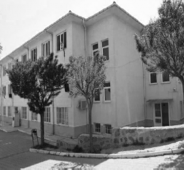
| NESRIN UÇMAKOĞLU V. T. A. H. S. |
| Construction Year: 2003 |
| Gross Construction Area: 4.783 m2 |
| Heating Source: Natural Gas |
| Number of Students: 677 |
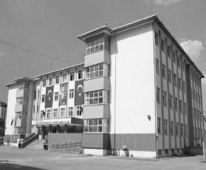
| TAŞDELEN IMKB V. T. A. H. S. |
| Construction Year: 2003 |
| Gross Construction Area: 12.610 m2 |
| Heating Source: Natural Gas |
| Number of Students:1397 |
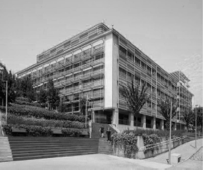
| SCHOOL OF LANGUAGES (SCOLA) OZYEGIN UNIVERSITY |
| Construction Year: 2014 |
| Gross Construction Area: 17.756 m2 |
| Heating Source:Natural Gas + Electricity + Renewable Energy Sources |
| Number of Students: 8.450 |
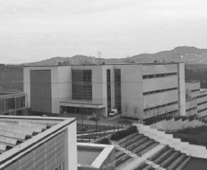
| ENGINEERING FACULTY OZYEGIN UNIVERSITY |
| Construction Year: 2011 |
| Gross Construction Area: 24.367 m2 |
| Heating Source: Natural Gas + Electricity + Renewable Energy Sources |
| Number of Students: 8.450 |
The project was carried out in three vocational and technical high schools located within the borders of Çekmeköy district. These are Hüseyin Avni Sipahi Vocational and Technical Anatolian High School, Nesrin Uçmaklıoğlu
Vocational and Technical Anatolian High School and Taşdelen IMKB Vocational and Technical Anatolian High School. These schools have been selected due to their proximity to Özyeğin University.
IMPACT
In the CAPACITY Project, our goal was to transfer the knowhow we gained on energy efficiency research and applications to the students at vocational schools. By doing so, we want to educate the next generation enablers on energy efficiency by changing the tools available to teachers and instructors. Considering that Turkey’s energy dependency to outside sources is around 70%, the efforts for increasing the energy efficiency literacy and awareness in the society should pay back significantly.
Likewise, spreading the understanding of energy efficiency can be possible by technicians and craftsmen working in new and renovated buildings who internalize energy efficiency practices and develop a coherent and innovative perspective for renovations.
For these reasons, Vocational and Technical High Schools have been chosen as the target audience. When this strategy becomes mainstream, contribution to climate change solutions with lowcarbon targets and to Turkey’s economy will be achieved with extensive energy efficient renovations.
